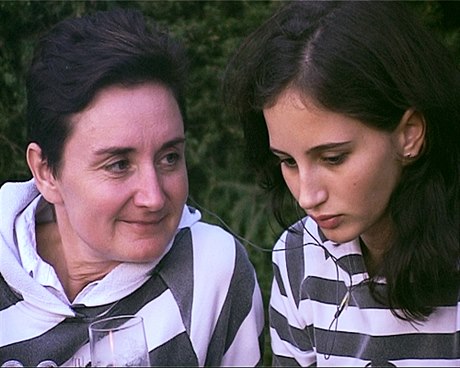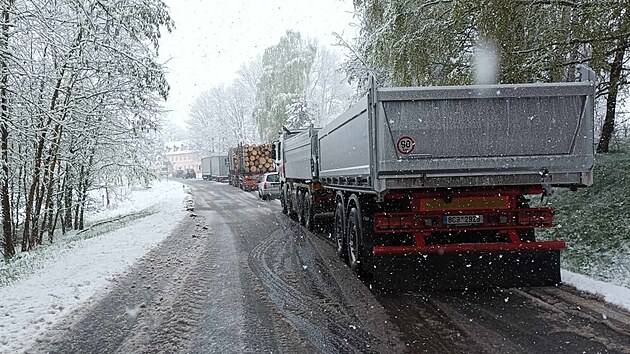Four former classmates from the Faculty of Philosophy at Charles University had one thing in common: membership on the strike committee that was largely responsible for the organizing of massive student strikes and protests during the Velvet Revolution.
Since 1989, their lives have taken different paths. Co-directors Tat’ána Marková and Natasha Dudinski spent four years creating the documentary “Revolutionary Girls,” capturing the breadth of human experience through the four women’s different points of view.
It’s hard to tell what lasting influence their experience during the revolution had on their lives. Besides the shared experience of political upheaval, their personal trials and tribulations are revealed through unexpectedly candid insight. As such, the title is a play on words.
“Natasha [Dudinski] wanted the title because for her it was very important. … She thinks there are some revolutionary ideas which all the girls share,” co-director Marková said during a discussion after a recent screening of the film at the American Center in Prague.
The four subjects of the film — writer Alena Ježková, member of European Parliament Jana Hybášková, singer-songwriter Pavla Milcová and translation company owner Alice Rahmanová — have all gone in somewhat surprisingly different directions, but their inherent strength is strikingly similar.
The impact of the revolution in the women’s lives is not forced from their narrative, instead it feels more as though they are the ones to mention it on their own, in between reflections on personal life.
Reflections on life, family and a different time
The only solid block of time in the documentary devoted to the revolutionary movements of 1989 is in a segment depicting the student strikes, protests and work on the strike committee typing up flyers and collecting names of strikers. The faces of the narrating women, 20 years ago, are indicated with subtle text on the black and white images.
The juxtaposition of these historic moments with scenes of the women, 20 years later, brings a greater sense of intrigue to their stories. They are not emblazoned heroes of the revolution but rather very individualistic figures that shared the same experience, and then went on to widely varying futures.
In some respects the women opt to let some of the legacy of the revolution fade into the past for the sake of the future.
“I don’t want to talk about [the revolution] with my daughter,” writer Ježková said in the film, explaining that she remembers ill feelings and guilt from her own mother speaking to her about life under communism. “[My daughter] is focused on the present and the future.”
Singer-songwriter Milcová takes the positive from her experience. “What I loved about the revolution was the communication. I’d love things to be like they were during the revolution, when people talked to each other and cared about the same thing. … Of course, it cannot last,” she said in the film. “So you must look for something similar in your family or music.” ‘This is not a happy life, and I can’t say I’m happy or content.’
“This is not a happy life, and I can’t say I’m happy or content,” MEP Hybášková confides to the camera in one scene. She explains openly that she feels compelled to be a part of world affairs, of change and progress. The pursuit is documented in her time in Brussels as well as trips to Israel. She admits that her lifestyle means not being there for her daughters. Hybášková (European Democrats, EDS) has represented the Czech Republic in the European Parliament since 2004. She is chairwoman of the European Parliament’s delegation for relations with Israel.
“But when I succeed to do what I want, like influencing a political step, I have a very good feeling. Maybe this feeling replaces a sense of happiness that other people feel,” she says.
“We got what we wanted,” said Rahmanová, a businesswoman and mother of three. “Emancipation and all the problems that go with it.”
Chance opportunities captured
At the start, the documentary was personal project for the two directors. Both had children and were musing as to how other women were handling children along with other aspects of their lives.
“So we decided we would make a movie,” Marková said during the discussion after the screening at the American Center. “We visited our friends from the Faculty of Philosophy and wanted to see how they manage because they have children but also do other things.”
Co-director Dudinski, who is based in Israel, was only in Europe for around two weeks at a time for filming. Luck favored them, as they were able to coordinate filming to capture events like Hybášková in Israel and Brussels and the launch of one of Ježková’s books. Ježková writes fairy tales, legends and historical books aimed at both children and adults.
“When we started filming, we didn’t know ahead [about these events],” Marková told Czech Position.
After four years of filming, the pair ran out of money to keep their project going. After much searching they enlisted the help of producer Jarmila Poláková, who produced the film “Four Velvet Men,” documenting the lives of four men after the revolution.
“It was interesting for me because I have another film that was made when we followed for 20 years four men who were involved in the start of the Velvet Revolution, so I thought that it would also be interesting to have a film about four women … from their point of view,” Poláková said at the screening. She was able to also persuade public broadcaster Czech Television to co-produce “Revolution Girls.”
With a total of 70 hours of footage and three weeks of difficult editing, Marková said what surprised her most about the project was how individualistic the women were.
“It was very interesting to observe them and how different they are,” said Marková, explaining that she saw it as a demonstration that there are so many ways one can live their life, there is no right or wrong way. “For me it was really interesting just to watch them and to listen to them,” she said.
The film has been shown on Czech Television and can be screened online in Czech.




